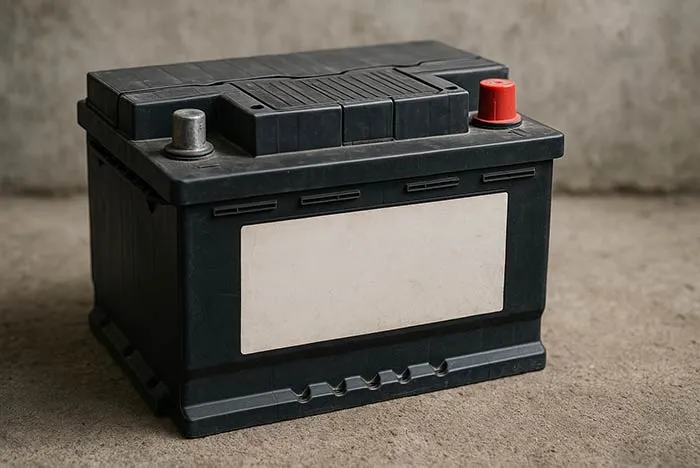
Nothing worse in the morning like a car that won't start. 9 out of 10 times is the battery.
Car battery maintenance isn’t just about avoiding that one-off failure. It’s about making sure your vehicle stays reliable year-round. A well-maintained battery saves you from unexpected breakdowns, costly replacements, and poor performance in extreme weather.
The average lifespan on a battery lasts 3 to 5 years. That could be extended with the right care.
That means knowing how to maintain car battery charge, following a simple battery maintenance checklist, and using smart car battery storage tips when your vehicle sits idle.
We will cover everything that will be helpful for you to maintain a healthy battery all year long like: Warning signs of failure, ways to extend battery life, and how to keep your car battery from dying when not in use. Whether you’re daily driving or storing your car for winter, these battery maintenance tips will help you get the most out of your battery.
How Long Should a Car Battery Last?
The average lifespan of a car battery is around 3 to 5 years ,but that could be different for battery brands and driving styles.
Short trips, not using your car for weeks living in a hot climate then the battery will wear out faster.
What is the average life of a car battery?
For most drivers, it’s around 4 years. But lifespan depends on driving habits, weather, and battery quality. Premium AGM (Absorbent Glass Mat) batteries tend to last longer than basic lead-acid types.
What shortens a car battery’s life?
⚠️ Frequent short drives that don’t fully recharge the battery
⚠️ Hot weather, which speeds up internal wear
⚠️ Letting the battery fully discharge
⚠️ Vibration from a loose or poorly mounted battery
What helps it last longer?
🟢 Driving regularly, at least 20–30 minutes
🟢 Parking in a garage or shaded area in summer
🟢 Using a trickle charger if the car sits for long periods
🟢 Regular inspections and clean connections
Signs Your Car Battery Is Going Bad
Car batteries don't fail without any warnings. There are signs first. Noticing their early signs can prevent you from getting stranded.
Take a look at this common symptoms of dying battery:
1. Slow engine crank
The engine takes longer than usual to start. It may sound weak or sluggish when turning over.
2. Dim headlights or interior lights
If your lights look noticeably dim when you start the car or idle, the battery could be struggling.
3. Battery warning light
Most cars have a battery symbol on the dash. If it stays on or flashes while driving, get your system checked.
4. Electrical issues
Power windows moving slower than normal. Radio or infotainment glitches. Odd flickering in interior lights. These point to low voltage.
5. Swollen battery case or corrosion
A bloated battery or heavy corrosion around the terminals means the battery may be overheating or leaking acid—both are bad signs.
6. Needing frequent jump-starts
If you’ve had to jump the car more than once in a short time, the battery likely can’t hold a charge.
7. Battery age
If it’s over 3 years old and showing any of the signs above, it’s probably time to replace it.
Battery Maintenance Checklist: What You Should Regularly Check
There are some key points that can help you maintain a healthy battery and not get surprised. Check the list below to keep things in good shape.
✅ Check for corrosion
Inspect the battery terminals and cable clamps. If there is a white or green powdery means there is corrosion. You can clean it with baking soda and water. You can use a toothbrush or small wire brush. Make sure you are wearing gloves.
✅ Inspect battery terminals
The cables should be tights and the terminals clean. Loose connection could cause poor charging or problem cracking the engine.
✅ Look for damage or swelling
If the case is cracked or bulging that means trouble. That could be caused by heat or overcharging causing the battery to swell. The best solution here is to replace the battery, if the case is looking too bad.
✅ Check fluid levels (for serviceable batteries)
Some older batteries have removable caps. Look inside to see if the electrolyte covers the lead plates. If low, top off with distilled water only. Never overfill.
✅ Test the voltage
Take the multimeter and check the battery voltage. The standard and healthy batteries read 12.6V or a little bit higher when fully charged. If voltage drops below 12.4V then it may need charging or replacement.
✅ Listen and Smell
Clicking sounds when starting, or a rotten egg smell (sulfur), can point to battery trouble. Sulfur smells mean leaking gas or internal failure.
✅ Secure the battery
Make sure it’s tightly mounted. Vibration shortens battery life. A loose battery can also damage the terminals or cables.
How to Maintain Car Battery Charge
Keeping your car battery charged isn’t hard, but it takes consistency. Batteries lose charge when not driven, especially in cold or hot weather. Here’s how to keep yours topped up and ready.
Drive often—and long enough
Short trips drain your battery. Starting the engine takes a lot of power, and if you don’t drive long enough, the alternator can’t fully recharge it.
Tip: Drive at least 20–30 minutes a few times a week. Highway speeds help more than stop-and-go city traffic.
Avoid leaving electronics on
Headlights, dome lights, or even a phone charger left plugged in overnight can drain your battery fast. Always double-check everything’s off before walking away.
Use a battery maintainer or trickle charger
If your car sits for days or weeks, use a maintainer. It keeps the battery topped up without overcharging. Great for seasonal cars or when you travel.
-
Plug-in maintainers work in a garage.
-
Solar maintainers are good for outdoor storage.
Check your alternator
The alternator recharges your battery while the engine runs. If your lights dim when driving or you need frequent jump-starts, the alternator may be weak or failing.
Have it tested if you suspect a problem. A bad alternator can kill even a new battery.
Keep the terminals clean
Dirty or corroded terminals can block current flow. Even if the battery is charged, it might not deliver power to the car. Keep connections clean and tight to avoid voltage drop.
Watch for parasitic drain
Some things keep drawing power even when the car is off—like alarms, clocks, or a faulty module. If your battery keeps dying overnight, get a parasitic draw test done.
How to Keep Car Battery from Dying When Not in Use
Usually vehicles don’t like sitting around and being driven and neigher batteries. If your vehicle stays for long periods like weeks it can drain the battery. But there are some measures to keep it alive.
Tips to prevent battery drain during storage:
💡 Use a battery maintainer.
A smart charger or trickle charger keeps the battery charged without overdoing it. Ideal if the car’s stored in a garage or driveway with power nearby.
💡 Disconnect the negative cable
No power flow = no drain. Use a 10mm wrench to loosen the negative terminal. This stops electronics like alarms, ECUs, or clocks from pulling power while you’re away.
Note: Disconnecting may reset radio presets or trip settings.
💡 Start and drive the car occasionally
If possible, start the engine every 1–2 weeks and let it run for 15–20 minutes. Better yet, take it for a short drive. This charges the battery and moves fluids through the engine.
💡 Store the battery indoors (if long-term storage)
If you're parking a car for months, it’s better to remove the battery and store it in a cool, dry place. Use a maintainer while in storage to keep it charged.
💡 Avoid extreme temperatures
Both hot and cold can speed up battery drain. If you can, store the car in a garage. Use an insulated battery blanket if exposed to freezing temps.
💡 Check charge level regularly
Even in storage, check the voltage every 2–4 weeks. Keep it above 12.4V. Anything lower can lead to sulfation, which damages the battery over time.
How to Service a Car Battery
Servicing your car battery is simple and can help extend its life. Always start with safety—turn off the engine, wear gloves and eye protection, and avoid touching both terminals at once. Begin by inspecting the battery for cracks, leaks, or swelling. If you see any of those, replace it immediately. Next, clean the terminals using a mix of baking soda and water to remove corrosion. Use an old toothbrush or wire brush to scrub, then rinse and dry the area.
Apply a bit of petroleum jelly or terminal grease to help prevent future buildup. Check that the terminal connections are tight and secure. If your battery has removable caps (most modern ones don’t), you can also check the fluid level. It should cover the lead plates inside—if it’s low, top it off with distilled water only. Use a multimeter to test the voltage; anything below 12.4 volts may need a recharge. When needed, charge the battery slowly with a maintainer or battery charger. Avoid relying solely on jump-starts, as that stresses a weak battery without solving the problem. A little routine care goes a long way toward keeping your battery reliable.
How to Make Your Car Battery Last Longer
A battery isn’t supposed to die after just two years—but it will if it’s neglected. The good news? A few smart habits can stretch your battery’s life to 5 years or more.
Start with your driving habits. Short trips are battery killers. Every time you start the car, the battery gives a big jolt of power. If you only drive a mile or two, the alternator doesn’t have enough time to recharge it. Try to drive at least 20–30 minutes a few times a week. Highway speeds are ideal. If you don’t drive often, use a battery maintainer to keep it fully charged.
Watch for parasitic drains, like interior lights left on, phone chargers, dash cams, or faulty electronics. Even a small draw overnight can kill a weak battery. Always double-check that everything’s off before locking the car.
Extreme temperatures also shorten battery life. Heat causes the internal fluids to evaporate. Cold slows down the chemical reactions inside. Whenever possible, park in a garage or shaded area. If you live in a very cold area, a battery blanket or insulator helps in winter.
Keep the battery clean and secure. Corrosion on the terminals or loose connections make the battery work harder than it should. Clean the terminals every few months and make sure the hold-down bracket keeps the battery from bouncing around.
Check the charging system too. A bad alternator won’t keep the battery topped up. If your headlights flicker, or your battery dies often despite being new, get the alternator tested.
Lastly, test your battery regularly. Use a multimeter or ask your local auto parts store—they often do it for free. If voltage drops below 12.4 volts often, that shortens lifespan.
Good maintenance doesn’t take much time, but it adds years to your battery’s life—and saves you from early replacements.
Is Car Battery Maintenance Free?
Yes—basic car battery maintenance is free if you do it yourself. Checking terminals, cleaning corrosion, and inspecting the case costs nothing but a few minutes.
Many auto parts stores like AutoZone, O’Reilly, or Advance Auto Parts offer free battery testing and charging. Some will even install a new battery for free if you buy it from them.
What’s not free? Professional diagnostics, parasitic drain testing, or battery replacements. But regular care helps you avoid those costs.
FAQ – Common Car Battery Questions
1. How often should you check your car battery?
It's recommended to inspect your car battery at least twice a year, or every 6,000 miles. Regular checks help identify potential issues early, ensuring reliable performance.
2. What drains a car battery overnight?
Common culprits include leaving lights on, faulty electrical components, or parasitic drains from devices like alarms or infotainment systems. A malfunctioning alternator diode can also cause the battery to drain when the engine is off. autotrader.co.uk+1Advance Auto Parts+1
3. Can a dead battery be recharged or revived?
A completely dead battery can sometimes be recharged using a battery charger. However, if the battery has been discharged for an extended period, its capacity may be permanently reduced. It's advisable to test the battery after charging to determine its health. Wikipedia+5mach1services.com+5Log in or sign up to view+5
4. Is it safe to disconnect the battery if I don’t drive often?
Yes, disconnecting the battery can prevent it from draining during extended periods of inactivity. However, be aware that this may reset certain electronic settings in your vehicle. Reddit
5. Does a new battery need to be charged before use?
Most new car batteries come fully charged and are ready for installation. However, if a battery has been sitting on the shelf for a while, it's a good idea to check its voltage and charge it if necessary. Bob Is The Oil Guy+3YouTube+3akbset.com+3

